Close
Log In using Email
Notes
Series Summary
anticipation - noun /an-ti-sə-pā-shən/ - A feeling of excitement about something that is going to happen in the future; the visualization of a future event or state. Paul's visit to Thessalonica is described in Acts 17, but his stay there was short due to the jealousy of the Jewish leaders, who incited a mob. Paul moved on to Corinth, where he wrote a letter back to this church that he loved. Because of their persecution, they were looking forward expectantly to the return of Christ, with expectant anticipation for what the future held. This letter is filled with encouragement and insight about growing in godliness and faith, and how spiritual growth should be motivated by their hope in the ultimate return of Jesus Christ. Although a brief letter, 1 Thessalonians is centered on Paul's message of hope, encouragement, and preparation for the return of Christ. This epistle, one of Paul's earliest letters, addresses a young church facing persecution and uncertainty. Paul commends their faith, love, and endurance, but also exhorts them to grow in holiness and remain steadfast as they await Christ's return. The overarching theme of anticipation provides both a source of comfort and a call to action for believers as they navigate the tension between present challenges and future hope. Paul begins the letter by expressing his gratitude for the Thessalonians’ vibrant faith, love, and hope in the gospel. He reminds them of how the gospel came to them not only in word but in power, and how they became examples to others in their faithfulness. This sets the stage for the theme of anticipation, as their faith points forward to the ultimate hope of Jesus' return. Paul emphasizes that the promise of Christ's return gives meaning to their perseverance and fuels their mission to live as witnesses of God's transformative power. The theme of Christ's return is explicitly addressed in every chapter, culminating in Paul's detailed description of the second coming in chapter 4. His words are encouraging, and issue a call to live as people of the light, avoiding complacency and spiritual lethargy, and to be watchful and self-controlled as we await the Day of the Lord. To do so requires the pursuit of holiness and love in our everyday lives as we look for Christ's return. Anticipation of the second coming is not an excuse for passivity but a motivation for active faith and obedience. Believers are to live with the awareness that their actions have eternal significance, striving to please God in all things. Anticipation. We live with the same sense of expectancy. Paul's letter of 1 Thessalonians challenges and encourages Christians to embrace a forward-looking faith that transforms the present while eagerly awaiting the fulfillment of God’s promises in Christ.Sermon Summary
Paul's letter to the Thessalonian church is built upon a love for the people there, their hope in Christ, and their anticipation of his return. Paul begins his letter with a heart full of concern and gratitude. He reflects on their faith, seeking to confirm its authenticity in light of the challenges they faced. With Timothy's encouraging report after a visit there, Paul's hope that their belief in Christ is deeply rooted and enduring is confirmed, and that the church is growing. The letter opens with a warm greeting from Paul, Silas, and Timothy, emphasizing their shared work in spreading the gospel. Paul identifies the Thessalonians as being "in God the Father and the Lord Jesus Christ," affirming their calling and identity in Christ. He offers them a blessing of grace and peace, encapsulating the essence of the gospel and pointing them to the unmerited favor and spiritual well-being that come from God. Paul’s gratitude for the Thessalonian believers is evident in his consistent prayers for them. He intentionally remembers their faith, love, and hope, not as abstract concepts but as tangible expressions of their spiritual growth. Paul is thankful for them, and expresses his gratitude in a variety of ways. Through his words, Paul not only encourages the Thessalonians, but also underscores the essential markers of a vibrant Christian life. His reflections point to a faith that works, a love that labors, and a hope that endures... qualities that continue to serve as a model for believers in every generation.
Anticipation: Now We Really Live
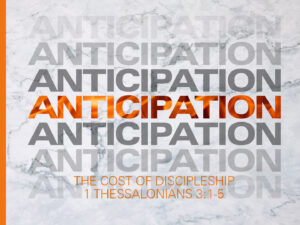
Anticipation: The Cost Of Discipleship
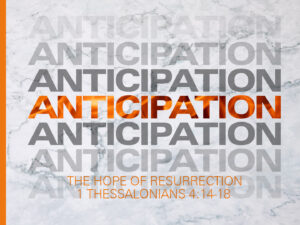
Anticipation: The Hope Of Resurrection
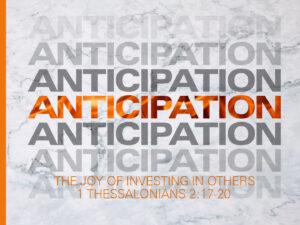
Anticipation: The Joy Of Investing In Others
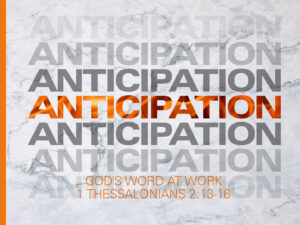
Anticipation: God’s Word At Work

Anticipation: Walk Worthy

Anticipation: How We Love

Anticipation: How We Speak

Anticipation: Why We Speak

Anticipation: Speak Boldly

Anticipation: Turning To God
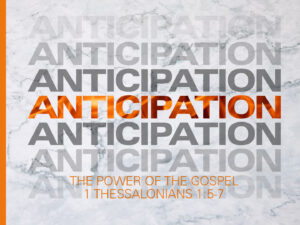
Anticipation: The Power Of The Gospel

Anticipation: Gratitude For The Gospel

Anticipation: Start With Gratitude

